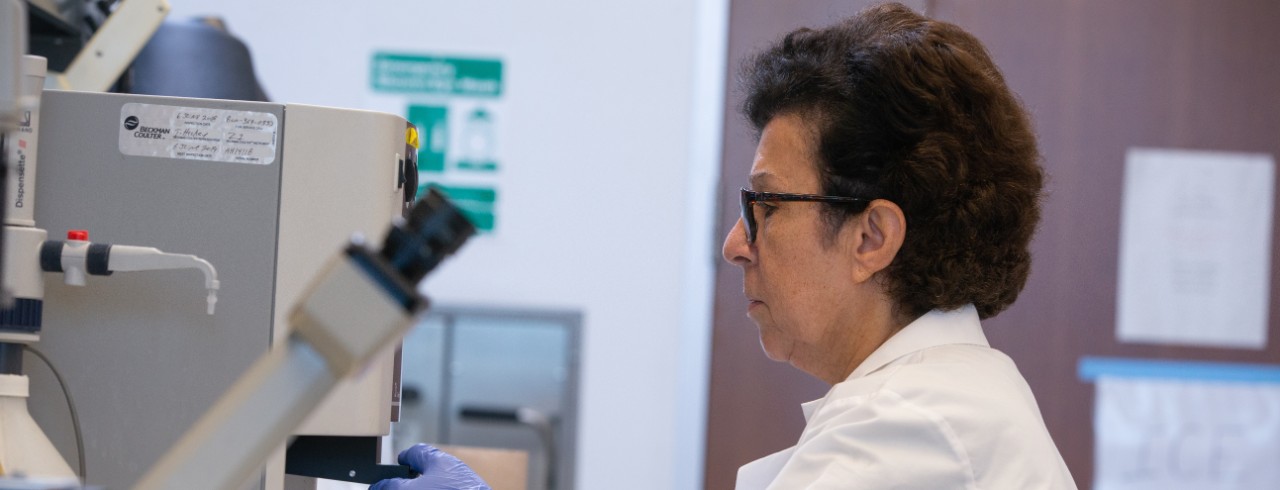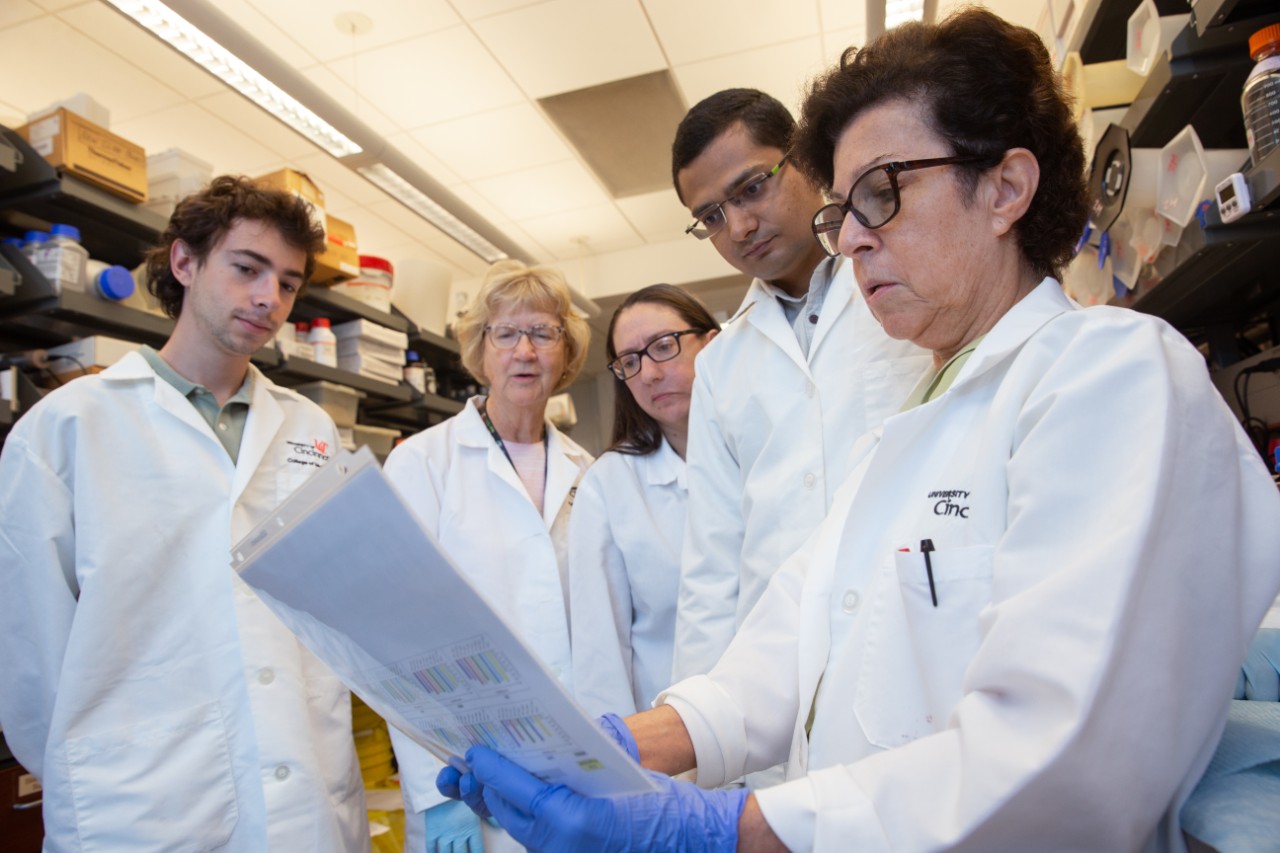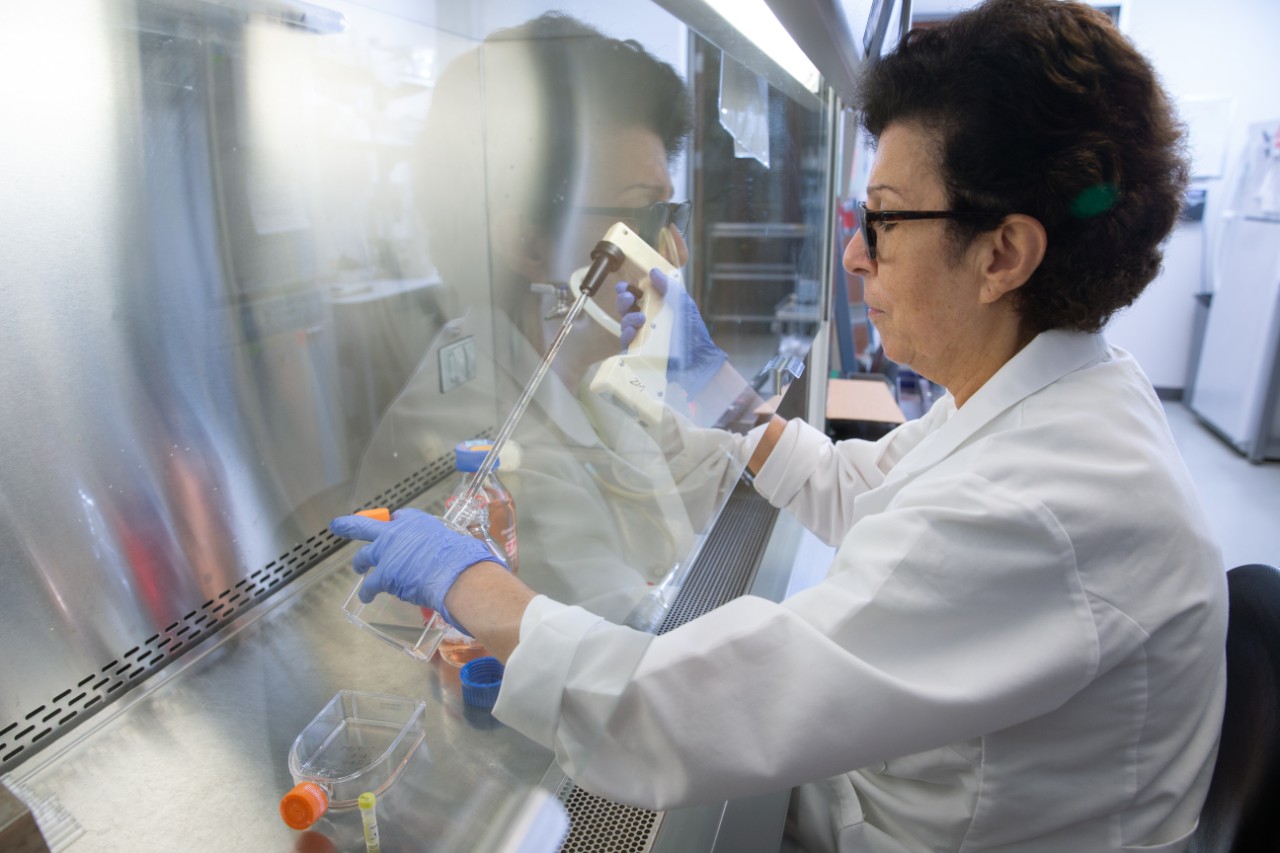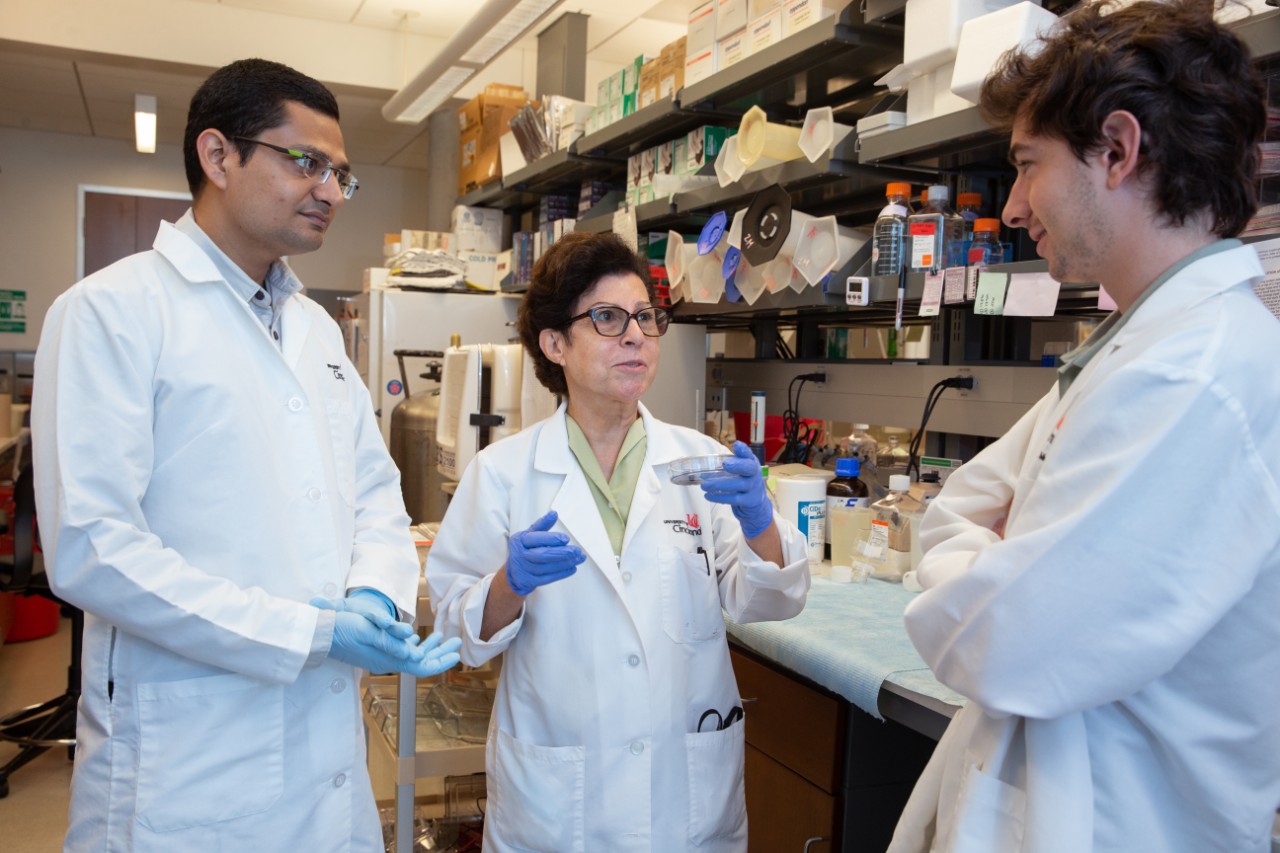
UC startup looks for ways to prevent skin cancer (while getting a tan)
Product could offer medical, cosmetic benefits
In the near future, people could get a tan while at the same time reducing their risk of skin cancer, skin damage, premature aging and wrinkles thanks to a product being developed by a University of Cincinnati Venture Lab-backed startup.
The startup, MC1R Ventures, is led by Zalfa A. Abdel-Malek, PhD, a professor of dermatology in the UC College of Medicine. She’s developing a topically applied product to initiate sunless tanning, which could have medical and cosmetic applications.
“Our peptides would not only give you the tan that you desire, but also it’s a safe tan because you’re not exposing yourself to the ultraviolet radiation from the sun or from tanning beds,” Abdel-Malek said. “And at the same time, you are enhancing your DNA repair capacity so when you go out in the sun, you’re already primed to fight that and prevent those mutations that can cause a lot of skin damage, including skin cancer, which is the most drastic effect.”

Zalfa A. Abdel-Malek, right, is developing a topically applied product to initiate sunless tanning, which could have medical and cosmetic applications.
MC1R Ventures is one of the many startups that have come out of the UC Venture Lab pre-accelerator program and received seed funding.
“Drug development is a very, very long process, and it requires a lot of funding,” Abdel-Malek said. “And so far, the funding that has gone into the development of this technology has been through federal grants and also a lot of money that came from small pilot projects from UC, and the UC Venture Lab has been very instrumental in its support, also.”
UC’s Venture Lab, operated by the Office of Innovation, provides a launch pad for entrepreneurs to turn their ideas into a startup reality. The UC Venture lab is located in the 1819 Innovation Hub in the Cincinnati Innovation District (CID), providing a connection point to talent, support and funding to help launch new companies.
The Venture Lab pre-accelerator program is available for free to all members of the university community. The program provides guidance to launching a startup and pairs aspiring entrepreneurs with executives for mentoring.
“This venture is exemplary of what is possible when we simplify and encourage entrepreneurial thinking within our university faculty community. With the support of a seamless process built on the Ohio IP Promise, resources and guidance from UC’s Venture Lab, Dr. Abdel-Malek, a tenured faculty member in the Department of Dermatology at the University of Cincinnati, was empowered and became an entrepreneur for the first time,”said David J. Adams, UC’s chief innovation officer. “Her start-up, and others within the university community, is proof that knowing the resources exist and how to access them can transform their ideas into reality. By equipping our faculty entrepreneurs with resources and ease to make their ideas possible, we are propelling the growth envisioned for the University and the Cincinnati Innovation District.”
Abdel-Malek has spent more than 25 years researching ways to prevent melanoma, the deadliest form of skin cancer. Her studies have focused on the melanocortin 1 receptor, also known as MC1R, a receptor in humans and animals that is important for regulating skin pigmentation.
“We were among the first in the world to show that this receptor is expressed on our pigment cells in the skin and that when you stimulate this receptor, this causes an increase in skin pigmentation,” she said. “The tanning response is mediated by activation of this receptor.”
The gene that codes for the receptor is responsible to a large extent for the diversity of human pigmentation. Studies have shown the most active form of the receptor is expressed in very dark-skinned Black individuals while the least activity is expressed in people with very fair skin and red hair.
“Not only does this receptor affect pigmentation, but it also affects the ability of the pigment cells to repair damage that’s caused by sun exposure,” Abdel-Malek said.

Zalfa A. Abdel-Malek has spent more than 25 years researching ways to prevent melanoma, the deadliest form of skin cancer.
To stimulate the receptor, which activates the DNA repair capacity of pigment cells in the skin, Abdel-Malek has developed peptides, short chains of amino acids linked by peptide bonds. She’s received three patents for peptides that can stimulate sunless tanning and DNA repair.
“Clinically this could be very important for the prevention of skin cancer because it’s very well known that individuals who have dark skin have less risk for skin cancer that’s caused by excessive sun exposure,” Abdel-Malek said.
MC1R Ventures’ method of tanning would be safer than being in the sun or a tanning bed, Abdel-Malek said, because it doesn’t require exposure to ultraviolet radiation, which can cause skin damage.
“You get the benefit — the activation of DNA repair, increased pigmentation — and yet you do not have to sit and roast yourself in the sun in order to get that. And of course it also reduces the risk of sun damage,” she said.
Not only does this receptor affect pigmentation, but it also affects the ability of the pigment cells to repair damage that’s caused by sun exposure
Zalfa A. Abdel-Malek UC professor of dermatology
The startup’s method would be superior to spray tanning, too, Abdel-Malek said. Spray tans color a person’s skin but don’t activate the receptors that reduce DNA damage and increase DNA repair.
“There are things on the market where you can just spray yourself with something that gives you a tan color, but it’s not really a tan and is very temporary” she said.
She also thinks it could be superior to sunscreen because it will penetrate the skin and interact with the body’s receptor, unlike sunscreen, which coats the skin but can wash off the body and leave it exposed.
Abdel-Malek expects her peptides will be beneficial to almost everyone. Even people with dark skin whose tanning is imperceptible could see the benefits of preventing skin damage.
The only people who wouldn’t benefit from the peptides would be people without any of the skin pigmentation receptor (MC1R) function. Those people generally have red hair, very fair skin and never tan at all — though not everyone with red hair and fair skin lacks MC1R function.
Each individual person has a limit on how much they are capable of tanning, and tans caused by MC1R’s peptides would fall into that natural range.
“Your skin is not going to exceed its natural capacity to be tan,” Abdel-Malek said. “You’re not going to turn somebody from being fair skinned to being, let’s say, black or super brown.”

Zalfa A. Abdel-Malek, center, is developing peptides that can stimulate sunless tanning and DNA repair.
MC1R Ventures is in the pre-clinical stage of developing its product with a drug development team working to develop a topical formulation and demonstrate the efficacy of the peptides.
After a formulation is finalized, Abdel-Malek will be able to begin tests on human skin. Part of the testing process will include determining when the optimal time is to apply the product and how long it would last, which Abdel-Malek expects likely would be similar to a tan from the sun.
“What we need to know is what is the peak time that you see the maximum effect after treatment and for how long this effect would last once you start the treatment,” she said. “These are two fundamental questions.
“We know from the biology of tanning, the physiology of it, the normal process of tanning is when you acquire a tan in the summer, it lasts for quite a while.”
If all goes well, MC1R Ventures could have a product ready for market in the next couple of years.
Featured image: Zalfa A. Abdel-Malek has created MC1R Ventures, a UC Venture Lab startup. All photos by Andrew Higley/UC Marketing + Brand
About UC Venture Lab
A leading model for urban-centered universities, the UC Venture Lab activates a high density of rapidly curated startup opportunities that attract outside entrepreneurial talent and investors. We connect university students, faculty, staff, and alumni to talent and funding to help launch new companies. Our team includes Office of Innovation staff as well as Entrepreneurs-in-Residence (EIRs), coaches, curated service providers, and subject matter experts.
About the Cincinnati Innovation District
The Cincinnati Innovation District® is a unique and thriving ecosystem that attracts, produces, retains and develops talent by co-locating and collaborating with organizations. Unveiled in 2020 by Ohio Governor Mike DeWine and Lt. Governor Jon Husted along with JobsOhio and innovation district leadership, the district envelops myriad innovation assets and access to some of the world’s leading academic and research centers, organizations and talent pools. Powered by the University of Cincinnati, the CID includes the world-renowned Cincinnati Children’s Hospital Medical Center and other national research centers. The district’s mission is to become a globally recognized talent hub and lead a transformational movement. The combination of industry engagement, unique experiential platforms and accessible research expertise — working at the pace of change — will become a model nationwide. For more information on the Cincinnati Innovation District, visit www.cincyid.com.
Related Stories
Esteemed gamers pack 1819 for Esports Ohio Regionals
April 24, 2025
Leading high school video gamers filled the 1819 Innovation Hub in early April to compete during Esports Ohio’s regional championship.
Why can perimenopause make migraines worse?
April 23, 2025
Experts say women who have migraine symptoms linked to their menstrual cycle are prone to migraine problems during perimenopause.
UC study finds vision loss fear may keep some from having...
April 23, 2025
A new University of Cincinnati study finds vision loss fears may deter some patients from cataract surgery, despite it being the only effective treatment. The research underscores the role of doctor-patient relationships in medical decisions.
